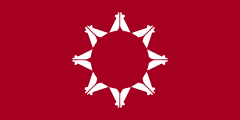Lakota activists declare secession from US
Friday, December 21, 2007
| We are no longer citizens of the United States of America and all those who live in the five-state area that encompasses our country are free to join us. | ||
—Lakota activist Russell Means | ||
A delegation claiming to represent the Lakota Indian Tribe, an Indian nation within United States borders, have signed a document stating that the tribe withdraws and or cancels all treaties with the U.S. and formally establishes independence from the country. The letter was hand delivered by activists for the tribe to Deputy to the Public Liaison at the State Department, Daniel Turner.
"We are no longer citizens of the United States of America and all those who live in the five-state area that encompasses our country are free to join us. This is according to the laws of the United States, specifically article six of the constitution. It is also within the laws on treaties passed at the Vienna Convention and put into effect by the US and the rest of the international community in 1980. We are legally within our rights to be free and independent," said Russell Means, an activist for Native American rights to reporters at a press conference on Wednesday in Washington, D.C..
"Today is a historic day and our forefathers speak through us. Our Forefathers made the treaties in good faith with the sacred Canupa and with the knowledge of the Great Spirit. They never honored the treaties, that's the reason we are here today," said Garry Rowland who is also known as Wounded Knee.

Image: Kwamikagami.
The delegation wrote a formal letter to the Department of State which was hand-delivered by activists of the tribe announcing their secession. So far, the U.S. has not issued a public response regarding their decision. Wikinews attempted to contact the State Department, but in an e-mail Director of the Office of Media Affairs Kirsten Petree stated that "this is not an issue for the State Department" and referred us to the Department of the Interior.
Under the declaration, the tribe, which consists of people from Nebraska, North Dakota, Montana, South Dakota and Wyoming, would create and issue its own driver's licenses and passports. According to a report by Agence France-Presse, all residents who currently live within Lakota borders can continue to reside there without paying taxes, as long as they renounce their U.S. citizenship.
The attempt to gain independence began in 1974 when activists wrote up a draft declaration of independence, which was modeled after the 1776 Declaration of Independence that the U.S. signed in declaring freedom from England.
Many of the treaties the tribe signed with the U.S. are over 150 years old.
"We have 33 treaties with the United States that they have not lived by. They continue to take our land, our water, our children," said activist Phyllis Young, who was one of the individuals who helped to organize a 1977 conference in Geneva on "indigenous rights."
The other members of the activist delegation were Duane Martin Sr., Gary Rowland and Phyllis Young. Duane Martin Sr. is a leader of a group called the Strong Heart Society. Gary Rowland is a leader of a group called the Big Foot Riders. Phyllis Young is the founder of a group called Women of All Red Nations.
Means' group is based in Porcupine, South Dakota on Pine Ridge Indian Reservation. Means' group is not an agency or branch of any Lakota tribe, although he ran unsuccessfully for president of the Oglala Sioux tribe in 2006.
Sources
[edit]- Faith Bremner. "Lakota group pushes for new nation" — Argus Leader, December 20, 2007
- "Descendants of Sitting Bull, Crazy Horse break away from US" — Agence France-Presse, December 20, 2007
- Mark Frauenfelder. "Lakota Natives Withdraw Treaties with U.S." — Boing Boing, December 20, 2007
- Press Release: "Freedom! Lakota Sioux Indians Declare Sovereign Nation Status" — Common Dreams NewsCenter, December 20, 2007
- "Lakota group secedes from U.S." — Rapid City Journal, December 20, 2007
External links
[edit]- Republic of Lakota - official website
- Bureau of Indian Affairs - official site, an agency of the United States Department of the Interior



